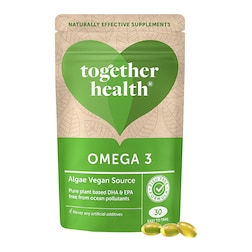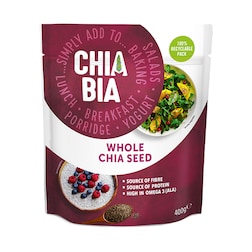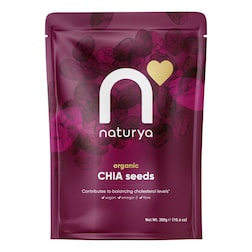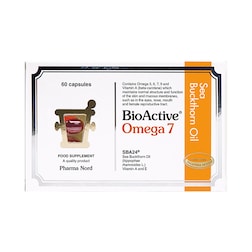10% off £30 OR 15% off £35
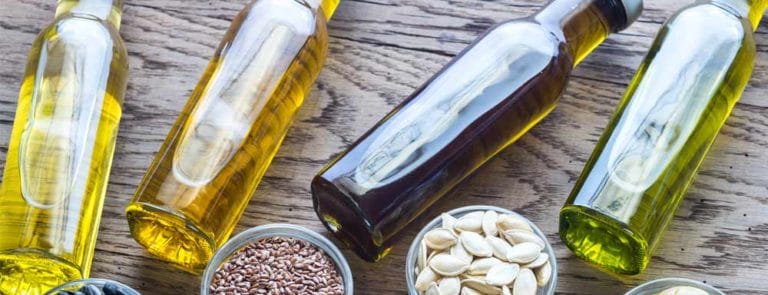
Omega-3 fatty acids are essential for our health, with the most common source coming from fish oils. But what are your options when you’re vegan or vegetarian and don’t eat fish?
Omega-3 plays a big role in a wide range of cellular and bodily functions – they’re called essential fatty acids for a reason!
But if you happen to be following a plant-based diet, or simply don’t enjoy eating oily fish, it’s important to know where you can find your best vegan Omega 3 sources. Keep reading for all the details…
What is Omega-3?
Omega-3 fatty acids are a group of polyunsaturated fats that fight inflammation and help keep our heart, brain, gut, joints and eyes healthy.
They may be incredibly essential for human health, but here’s the thing; the body can’t make them itself so it has to rely on obtaining sufficient amounts from what we eat.
There are three main Omega-3 fatty acids - alpha-linolenic acid (ALA), eicosapentaenoic acid (EPA), and docosahexaenoic acid (DHA).
ALA is mainly found in plant oils, such as flaxseed, soybean and canola oils. Meanwhile, DHA and EPA are found in fish and other seafood. 1
The human body can convert some ALA into EPA and then to DHA, but only a minimal amount.
Therefore, getting EPA and DHA from food, and dietary supplements, is the most practical way to increase how much Omega-3 you have in your system and make sure you’re getting enough of it every day.
Handpicked content: A guide to natural anti-inflammatory sources
Summary
Omega-3 is a group of polyunsaturated fats that are responsible for helping keep our heart, brain, gut, joints and eyes healthy.
The human body doesn’t naturally make Omega-3, so it’s important we get what we need from our diet and/or by taking supplements.
Why does the body need Omega-3?
Meanwhile, DHA has been highlighted for its role in foetal and infant brain development, while ALA may support the maintenance of healthy blood pressure and cholesterol levels.
Summary
- Omega-3 helps keep us healthy in so many ways
- Especially EPA and DHA (two of the three main forms of Omega-3) that protect the heart and blood vessels from disease
- Meanwhile, ALA, the third form of Omega-3, can help lower blood pressure and cholesterol levels
What is DHA?
It’s one of the main three forms of Omega-3 and is essential for brain development during pregnancy and early childhood.
During the first six months of life, DHA is particularly crucial for the development of the nervous system.
Women who are breastfeeding are encouraged to continue taking 200mg to 300mg of DHA a day, Most infant formulas also contain DHA too.3
As with all Omega-3 fatty acids, DHA’s also been linked with improved heart health and vision and reduced inflammation.
More specifically, DHA makes up 97% of the Omega-3 fatty acids that are present in the brain and 25% of the brain’s total fat content.
Summary
- DHA is one of the three main forms of Omega-3
- It’s essential for brain development during pregnancy and early childhood
Plant Omega 3 vs. animal Omega 3
Omega-3 comes in several different forms, including both animal and plant-based sources.
As each one has a slightly different structure, Omega-3 is broken down differently in the body, depending on what the source of it is.
As we’ve already established, the three main types of Omega-3 used by the human body are EPA, DHA and ALA.
Nuts and seeds, especially walnuts, flaxseeds and chia seeds are rich in ALA, while algae, such as spirulina and chlorella contain EPA and DHA.
Although our bodies convert ALA naturally, the process isn’t very efficient. Various studies suggest that most people convert less than 10 to 20% of the ALA they eat into EPA or DHA.
Consuming too much Omega-6 from vegetable oils or having deficiencies in certain nutrients, such as zinc can also hinder the conversion process.
Summary
- Both animal and plant-based sources of Omega-3 are available
- Nuts and seeds, especially walnuts, flaxseeds and chia seeds are rich in ALA
- While algae, such as spirulina and chlorella contain EPA and DHA
Are vegans usually deficient in Omega-3?
On the whole, people who eat a plant-based diet don’t tend to struggle to get enough Omega-3 in their diet because there are so many food sources that contain it (we’ve listed some examples below).
In fact, one study in particular revealed that people who follow a vegan diet tend to have intakes above the recommended amounts for Omega-3 fats.4
But when it comes to measuring Omega-3 levels, the likelihood of having lower EPA and DHA levels among vegans is, on average, higher.
However, this claim is yet to be backed up by medical studies. Meanwhile, the connection between heart health and a vegan diet has been proven by researchers.
Omega-3 in vegetables
Omega-3 fatty acids can also be found in quite a few different vegetables. Here are some examples of Omega-3 vegetables:5
| Vegetable (1 cup) | Amoun of Omega 3 |
|---|---|
| Green bell peppers | 886mg |
| Red bell peppers | 822mg |
| Cooked kale | 482mg |
| Edamame beans | 472mg |
| Brussels sprouts | 270mg |
| Cauliflower | 207mg |
| Kimchi | 206mg |
| Broccoli | 186mg |
| Spinach | 166mg |
| Globe or French artichokes | 99mg |
| Green cauliflower | 96mg |
| Leeks | 88mg |
| Courgette | 76mg |
| Bok Choy | 39mg |
| Pumpkins | 5mg |
Vegan Omega 3 sources - food
-
Brussel sprouts
44g of raw sprouts contains 44mg of ALA.
Once cooked, the Omega 3 level triples; providing 135mg of Omega 3 for every 135mg serving.[i]
Similar Vitamin C products
-
Flaxseed
Flaxseed is one of the best sources of ALA. A daily dose of ALA from flaxseeds has been found to reduce inflammation in the blood, while some studies suggest that flaxseed oil could support the maintenance of healthy blood pressure.
Handpicked content: Supercharge your day with flaxseed
-
Chia seeds
Chia seeds have been recognised as being another good source of ALA.
28g of chia seeds can provide 4,915mg of Omega 3. Create a chia pudding or sprinkle chia seeds on top of salads, yoghurt and smoothies.[i]
[i] https://www.healthline.com/nutrition/7-plant-sources-of-omega-3s#section5
American researchers discovered that eating ground chia seeds every day for seven weeks increased levels of EPA in the blood by 30%.
In another trial published in the European Journal of Clinical Nutrition, eating bread baked with chia seeds helped to reduce blood sugar levels.
Similar Vitamin C products
-
Echium seed oil
Echium seed oil is unusual because it contains high levels of GLA (gamma-linolenic acid) and SDA (stearidonic acid), as well as ALA.
SDA is another Omega-3 fatty acid. Before ALA can be converted into EPA or DHA, it has to be converted into SDA.
However, SDA doesn’t need to be converted, so echium seed oil is better than flaxseed oil at boosting levels of EPA in the body.
This makes it a great alternative to fish oil for vegetarians or vegans.
-
Walnuts
Walnuts happen to be the only tree nut that are an excellent source of ALA.6 As one of the best plant food sources of Omega-3, just 200g of walnuts contains 2.2g (the equivalent to a small handful) of ALA.
You can also increase your ALA levels by using walnut oil, simply drizzle it on top of your salads for another healthy hit of plant-based ALA.7
-
Edamame beans
Edamame beans, also referred to as soybeans, are a good source of Omega-3 fatty acids
. What’s more, edamame are rich in protein (8g in a half cup) and fibre (4g in a half cup), making them an ideal healthy snack that’s guaranteed to leave you feeling fuller for longer.8
-
Kidney beans
After edamame beans, kidney beans are widely recognised as being another valuable source of Omega-3 fatty acids.
They may be one of the lower sources of plant-based Omega-3, containing around 10% of your daily intake, but they’re still worth adding to your diet.
They’re full of protein and fibre, and happen to contain both iron and folate too, two minerals that are essential for pregnant women.9
-
Canola oil
One tablespoon of canola oil contains 1.28g of Omega-3, which is more than a day's serving for women.
It also happens to have a neutral flavour, be low in saturated fat and contain Vitamins E and K. Use it as a vinaigrette or to oven-roast your Omega-3-rich vegetables.10
Summary
- An abundance of Omega-3 can be found in so many different plant-based food sources, vegetables included
- Algae, flaxseed and chia seeds and peppers, kale and edamame beans contain particularly high levels of Omega-3
Do vegans need to take Omega-3 supplements?
Some of the main Omega-3 supplements include fish oil, krill oil, cod liver oil and algal oil (a vegetarian source that comes from algae).
It’s possible for vegans to get all the Omega-3 they need from their diet.
However, if they aren’t consuming a wide range of plant-based Omega-3 foods, they may find they need to take a supplement to make sure they are getting enough every day.
5 of the best vegan Omega-3 supplements
We've rounded up 5 of the best omega-3 supplements you can take if you're vegan.
Vegan cod liver oil
Similar Vitamin C products
Similar Vitamin C products
ALA vegan
Takeaway
Omega-3 is essential for helping keep us all healthy in so many ways, particularly when it comes to eye, brain and heart health.
Fortunately, for vegans, there are plenty of different Omega-3 food sources (nuts, seeds and vegetables) that contain all or some of the three main forms of Omega-3 (DHA, ALA and EPA).
Depending on your diet, you may be able to get all the Omega-3 you need from food – especially as there are so many different vegan Omega 3 sources to choose from.
But if you find that you may be lacking, then it’s possible to easily increase your levels by taking Omega-3 vegan supplements.
Getting enough Omega-3 in your system can be as simple as making sure you’re eating a tablespoon of chia seeds or ground linseed, two tablespoons of hemp seeds or six walnut halves a day, and cooking with vegetable (rapeseed) oil.11
Now that you’re here, we think you may find this article useful, ‘6 of the best vegan calcium sources.’
Ella Mills: What a plant based diet can do for you
In 2011, Ella Mills was diagnosed with postural tachycardia. Ella began to research nutrition, learned to cook and started Deliciously Ella in 2012. In this episode we discuss:
- How eating fresh, natural foods can do wonders for health
- Ways to add more plants to your diet
- Tips for fitting wellness into your day
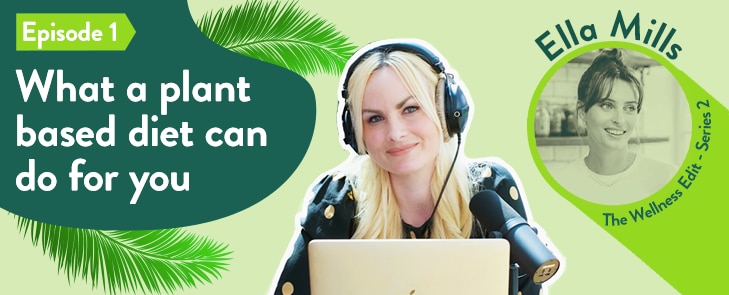

Last updated: 13 June 2022
https://www.ncbi.nlm.nih.gov/pubmed/9637947
https://www.ncbi.nlm.nih.gov/pubmed/8604658
https://www.ncbi.nlm.nih.gov/pubmed/16844912
https://www.ncbi.nlm.nih.gov/pubmed/17616740
https://www.ncbi.nlm.nih.gov/pubmed/22538527
https://www.ncbi.nlm.nih.gov/pubmed/20087375
https://www.ncbi.nlm.nih.gov/pubmed/26892399
https://www.nutraceuticalbusinessreview.com/technical/article_page/Rapid_EPA_uptake_with_algal_oil/99582
https://www.ncbi.nlm.nih.gov/pubmed/25740909

